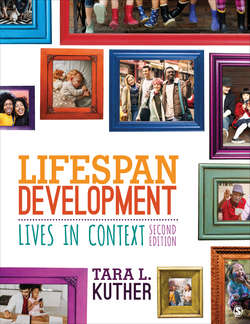Читать книгу Lifespan Development - Tara L. Kuther - Страница 299
На сайте Литреса книга снята с продажи.
What Do You Think?
Оглавление1 What are some of the challenges of studying father–child relationships? How might researchers address these challenges?
2 Why do you think fathers are more likely to be “play mates” than mothers?●
Toddlers walk on their own, express their own ideas and needs, and become more independent. Their developmental task is to learn to do things for themselves and feel confident in their ability to maneuver in their environment. According to Erikson (1950), if parents encourage the toddler’s initiative and allow him to explore, experiment, make mistakes, and test limits, the toddler will develop autonomy, self-reliance, self-control, and confidence. If parents are overprotective or disapprove of the child’s struggle for independence, the child may begin to doubt his abilities to do things by himself, may feel ashamed of his desire for autonomy, may passively observe, and may not develop a sense of independence and self-reliance.
Both trust and autonomy develop out of warm and sensitive parenting and developmentally appropriate expectations for exploration and behavioral control throughout infancy and toddlerhood. Without a secure sense of trust in caregivers, toddlers will struggle to establish and maintain close relationships with others and will find it challenging to develop autonomy. Adjustment difficulties are more likely when children do not develop a sense of individuality and confidence in their own abilities to meet new challenges. Much of the research on parenting examines mothers, but infants’ interaction relationships with fathers also predict autonomy and social competence. This is true across cultures and the accompanying feature, Cultural Influences on Development, looks at father–infant interactions.
